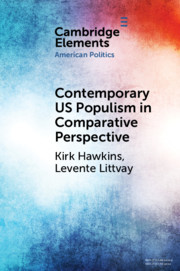Description
Contemporary US Populism in Comparative Perspective
Elements in American Politics Series
Authors: Hawkins Kirk, Littvay Levente
Language: English
Subject for Contemporary US Populism in Comparative Perspective:
Approximative price 22.46 €
In Print (Delivery period: 14 days).
Add to cart
Publication date: 05-2019
Support: Print on demand
Support: Print on demand
Description
/li>Contents
/li>Biography
/li>
With the victory of Donald Trump in the 2016 United States presidential election, populists have come to power in the US for the first time in many years. However, US political scientists have been flat-footed in their response, failing to anticipate or measure populism's impact on the campaign or to offer useful policy responses. In contrast, populism has long been an important topic of study for political scientists studying other regions, especially Latin America and Europe. The conceptual and theoretical insights of comparativist scholars can benefit Americanists, and applying their techniques can help US scholars and policymakers place events in perspective.
1. Introduction; 2. The concept of populism: putting leaders in context; 3. The causes of populism: explaining the victory with Ethan Busby (Ph.D. candidate, Northwestern University, Evanston, Illinois, US); 4. The consequences of populism and how to mitigate them; 5. Conclusion; References.
Kirk Hawkins studies populism and Latin American politics. He wrote Venezuela's Chavismo and Populism in Comparative Perspective (Cambridge, 2010), co-authored Latin American Party Systems (Cambridge, 2010), and co-edited The Ideational Approach to Populism: Concept, Theory, and Analysis (2019). He currently directs Team Populism.
Levente Littvay researches the psychology of populism, survey and quantitative methodology. He is an academic co-convener of the European Consortium for Political Research Methods Schools, and Team Populism's head of Team Survey.
Levente Littvay researches the psychology of populism, survey and quantitative methodology. He is an academic co-convener of the European Consortium for Political Research Methods Schools, and Team Populism's head of Team Survey.
© 2024 LAVOISIER S.A.S.
These books may interest you

Religion and the Rise of Populism 160.25 €



